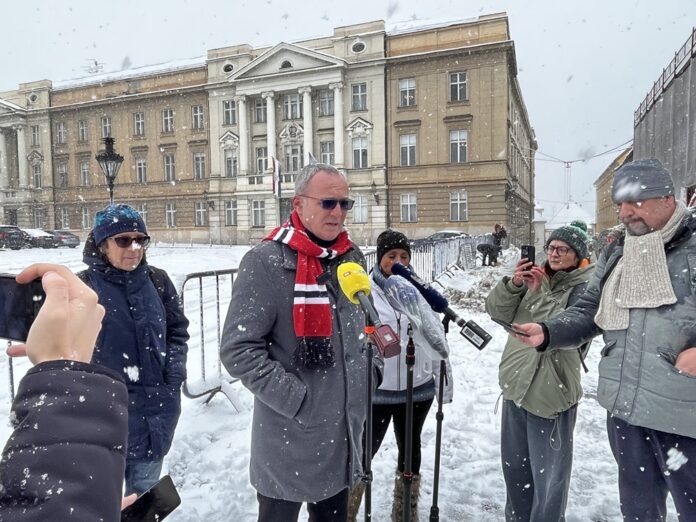The Croatian Journalists’ Association will organize a protest on Wednesday, January 31, at 11 a.m. at St. Mark’s Square in Zagreb against the “Law of Dangerous Intentions”, announced at a press conference of the Croatian Journalists’ Association under the title “Stop the Law of Dangerous Intentions” at St. Mark’s Square in response to amendments to the Crominal Code introducing the criminal offense of unauthorized disclosure of the content of investigative or evidentiary actions.
CJA President Hrvoje Zovko called on all citizens to participate in the protest at St. Mark’s Square.
This concerns all of us, and through this protest and all other legitimate means, we will collectively resist and fight against the evident aggression against the journalistic profession. It’s time to say enough and stop the state aggression carried out by Prime Minister Plenković, the government, and coalition partners against public interest, said Zovko, illustrating with the example of Klara Buntić how dangerous and detrimental this law, known as “Lex AP,” is to democracy.
If this law had been in force when Klara Buntić shared her difficult and horrifying story and fate, she would have been targeted by this law. Therefore, this is an attack on all of us; we must stop the enactment of this law. Those who raise their hands for this law in the Parliament will be participants in the state aggression against public interest, Zovko said, adding that all this is happening precisely in the super-election year.
The fact that the proposer made an exception for journalists means nothing because, according to the law, journalists’ phones can be searched, they can be interrogated, and, therefore, systematically harassed. If this law is enacted, we will not stop. We will continue with actions, even if they arrest us, harass us, or whatever they do, Zovko said, adding that CJA will always stand behind journalists and defend the profession.
Ana Raić, the president of CJA’s Internet Journalists Branch, a journalist with a decade of experience covering sensitive events, spoke about the dangers posed by the enactment of this law, reminding that there have never been problems until the initials “AP” appeared in a text message exchange.
I can responsibly say that the problem arose only when these initials appeared. That’s when these criminal provisions started. No one can tell me that we have obstructed criminal proceedings and revealed secrets. It’s a farce that this law aims to protect privacy or prevent the breakthrough of an investigative process, Raić said, adding that journalists will never reveal their sources, which also means they will be harassed for it.
Goran Gazdek, a member of CJA’s Executive Board, emphasized that local media and journalists have faced significant problems before because journalistic sources were targeted.
This law will completely prevent any contact with sources, and media in local communities can be shut down, Gazdek said.






